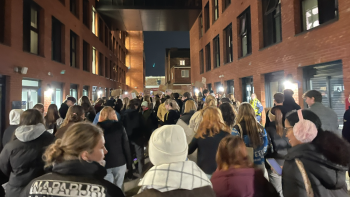On the evening of November 14, over a thousand students gathered, as recorded by the University’s Student Union, to advocate for ‘safety in public spaces, especially after dark.’
The Reclaim the Night march, which dates back to the 1970s, has become a well-loved tradition in Lincoln, with 2024 being one of the biggest turnouts that the University’s Student Union has seen yet.
Student support and development officer Amelia Hinton began the night with a speech before leading the march.
Amelia said: “The night should no longer be a time that feels off-limits or confining; I believe this starts by speaking out if we see injustice and standing together as a united community to acknowledge that fear should not be a part of anyone’s experience here at Lincoln.

“Since I’ve been at university, this event has grown and grown.”
After the speeches, students, staff, and volunteers marched from the university campus to the city streets. The peaceful protesters carried signs, badges and bracelets to show their commitment and spirit towards the importance of the cause.
There was a mixture of men and women protesting, with one student, Charlie Hooton, commenting: “Even if the problem doesn’t affect you, it’s nice to echo others’ voices. It’s not enough to not be part of the problem; you have to be part of the solution.”
Political and social issues have sparked an increase in awareness towards putting an end to violence against women.
Jess Paton, a student at the university, spoke about her reasons for protesting: “Gender globally, there are a lot of groups across the world who don’t have voices. It’s about using our privilege to know that we have struggles, but we can voice our struggles; everyone’s voices are so important.”
Members of the emergency services also attended the peaceful protest as supporters.
Sara Munton, deputy police and crime commissioner, said: “Reclaim the Night is crucial to me because it empowers women to take back public spaces free from fear. As a leader in tackling violence against women and girls, it highlights the importance of safety, solidarity, and collective action in creating lasting change.”
The peaceful protest aligned with the broader White Ribbon Campaign, which asks supporters to wear a white ribbon as a symbol that they will never commit, condone or stay silent towards violence against women.

